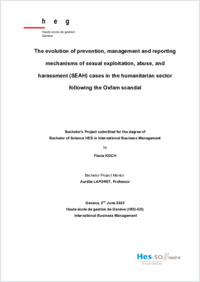The evolution of prevention, management and reporting mechanisms of sexual exploitation, abuse, and harassment (SEAH) cases in the humanitarian sector following the Oxfam scandal
SONAR|HES-SO
- Koch, Flavia
- Laforet, Aurélie (Degree supervisor)
- Genève : Haute école de gestion de Genève
150 p.
Bachelor of Sciences HES in International Business Management: Haute école de gestion de Genève, 2023
English
Humanitarian assistance is increasingly needed due to climate change, health crises such as cholera or COVID-19, and man-made crises. Humanitarian assistance saves lives, provides emergency responses, and ensures food security during crises. Aid organizations usually operate in conflict zones where violence is present and human rights are not fully respected. These highly volatile contexts increase the vulnerability of the most marginalized individuals, including women and children. Sexual violence is one of the threats they face. The issue of abuse of power in a context of high vulnerability has been a concern in the humanitarian sector since 2001 and the Mano River scandals. More recently, the 2018 'Oxfam Scandal' once again brought abuses to the forefront. Humanitarian staff were accused of sexual abuse against members of the local communities. This crisis highlighted again the issue of sexual exploitation, abuse, and harassment in the humanitarian sector. This research aims to understand if this scandal had an impact on the organization’s management of abuses and in which main dimensions. Three main pillars are considered: prevention, management, and reporting mechanisms of cases of SEAH (Sexual Exploitation, Abuse and Harassment), with the understanding that this acronym (SEAH) encompasses very different realities: from Exploitation to Harassment. To this day exploitation remains the most serious breach and, it seems, the most difficult to address. One important element is to understand whether employees are aware of what the institution has put in place. Qualitative data has been gathered from five different organizations, mostly from people working with SEAH directly. These interviewees show that Oxfam has boosted the attention given to that subject and increased resources just after the crisis, with special units taking care of cases being created and trainings implemented in all organizations. Challenges were also mentioned including addressing exploitation, considering, and challenging cultural differences, the lack of implication of management, the lack of resources, the high turnover in the humanitarian sector, amongst others. The survey shows that most employees have received training on SEAH, and most of the people are aware of the reporting mechanisms of their organization, nevertheless, the efficacy of trainings is not optimal, and employees still face barriers in reporting incidents. Suggestions were given such as having the management more engaged, giving pragmatic training, following a survivor-centred approach, and many others. An analysis of these data has been made to draw adapted recommendations. As a result, it is necessary to improve prevention, enhance training and adapt reporting mechanisms to the locals, reinforce accountability but mainly work on information sharing and collaboration between organizations.
- Language
-
- English
- Classification
- Economics
- Notes
-
- Haute école de gestion Genève
- International Business Management
- hesso:hegge
- Persistent URL
- https://folia.unifr.ch/global/documents/327557
Statistics
Document views: 258
File downloads:
- IBMBT_23_KOCH_Flavia_VF.pdf: 225
